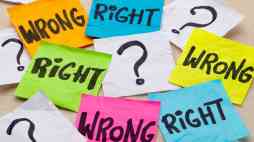Morality can be generalized, for the sake of convenience, as a sense of what is right and what is wrong. There are three notable sources of morals: religion, traditional or cultural values and commonly held beliefs (or a way of life) and at least two of these are under the influence of man.
Since the creation of man, the issue of what a man is to do and what a man is not to do have been an outstanding one. Over the course of time, religion and conscience have been able to provide some if not all answers and grounds as to what a man can and cannot do. The first problem that exists in answering these questions is that although words such as “chivalry” and “justice” are very often tossed around, their true meaning in the sense of total acceptance is not understood or hasn’t yet been established for that particular matter.
Can justice be absolute? The answer quite simply for me at least would be no. I think justice for one person will always mean pain or suffering for another, for instance a man being executed for a heinous crime would be justice for the victim, but would it really be justice for the family of the criminal? There can be a logical extension made in this regard, assuming the family is dependent upon that particular person economically, which is true for many cases. What happens next? And how fairly justice has been done?
This is just one aspect, another would be that since the question of right and wrong and morality itself is one that’s very subjective in nature, how can there be a universal form of justice when the entire universe does not conform to one set of moral values? Proof for this particular claim would be diversity of opinion across the world with regard to issues as that of legalization of prostitution or abortion or even euthanasia for that matter. Another way to go about it would be that if we abandon some values of the past in an attempt to become civilized, by definition the entire concept of feminine empowerment and women being given equality. Doing just that implicitly means that we as a race are admitting to the fact that in some point in time because of our social mindsets and moral values, a significant amount of women were not given justice, or were even burnt at the sake.
The human race is mainly an immoral one and I base this claim on not just our current status but our past, the blood we’ve shed, the lives we’ve taken and how human nature dominantly tilts towards greed but also on the fact that we have led to the destruction of almost everything that we come on contact with. I speak of species that once used to exist, the dodo bird for instance and of the earth itself. Thus, we cannot leave it upon man to follow his conscience and endorse the values of a society which is why we have laws.
The purpose of laws as sensibly stated in the social contract is to ensure that the rights of one individual end where those of another begin which seems reasonable enough but where do these laws come from? The answer would be that they are a combination of both common sense and moral values. The problem lies in the fact that these values are neither perfect nor always right and have on more than one occasion proved to be bigoted against one class/sect/race/gender of society; the slave trade aimed at marginalizing the poor, women not being allowed to vote, black trade and what not!
Similarly, one might say that now such laws cease to exist in the status quo and therefore, the need to ponder over them fades away. But we have already established that what seemed ‘civil’ a couple of hundred years down memory lane is not anymore. Likewise, if we talk about appropriate issues today, prostitution for instance, laws do exist which aim at sidelining prostitutes although a hundred years from now society might deem it ‘civilized’ to be a prostitute.
On this note, a need comes into existence that these problems be addressed. The question is as to how one can address on such types of issues. One way of going about it could be a complete separation of moral values from the state and its governance, similar to the idea of secularity except that it deals with moral values and social mindsets. Therefore, one must not ignore the fact that until humanity has perfected its ideas as to what justice truly requires and how it needs to be absolute and not a commodity that can be expanded on the convenience of man. Instead morality and legislation should indeed be treated separately. The main problem is that of the world where morality and legislation are exclusive of each other, with another world where legislation is based upon a consensus between a particular group of individuals who have the authority to create laws and enforce them. These individuals will not necessarily ensure that the rights of everyone are protected and the likelihood of them serving their own interests is greater, which is why man will always be in a conflict over morality and the legislation.




Brilliant read. 👌👌👌
LikeLiked by 1 person
morality has been lost in people these days. surely hope in humanity has been regained after reading your article.
LikeLiked by 1 person
marvelous!!! brilliant, haven’t went across piece of art like this. deserves a lot of appreciation!!!
LikeLiked by 1 person
Good read
LikeLiked by 1 person
A very well written article.
LikeLiked by 1 person
Good Job !!
LikeLiked by 1 person
good read !!
nice workk.
LikeLiked by 1 person
Morality is not just any old topic in psychology but close to our conception of the meaning of life. Moral goodness is what gives each of us the sense that we are worthy human beings. However, Modern morality and manners suppress all natural instincts, keep people ignorant of the facts of nature and make them fighting drunk on bogey tales.
Compassionate and deep thought i must say !! You have almost covered all the aspects of morality.
It is an exquisite piece of work. Well done!! (y) 🙂
LikeLiked by 1 person
This gives hope in humanity!
LikeLiked by 1 person
Brilliant work and some food for thought.
LikeLiked by 1 person
Really good read.
honestly doubt human mind can ever reach perfectly objective definitions of morality or justice. every thought is belongs a person with a set social circumstances, education, distinct upbringing, religious understanding, economic class etc, and every thought is penned at a particular point in time and in a particular space that determines its content essentially.
LikeLiked by 1 person
A very well executed piece of writing. keep up the great work (y)
LikeLiked by 1 person